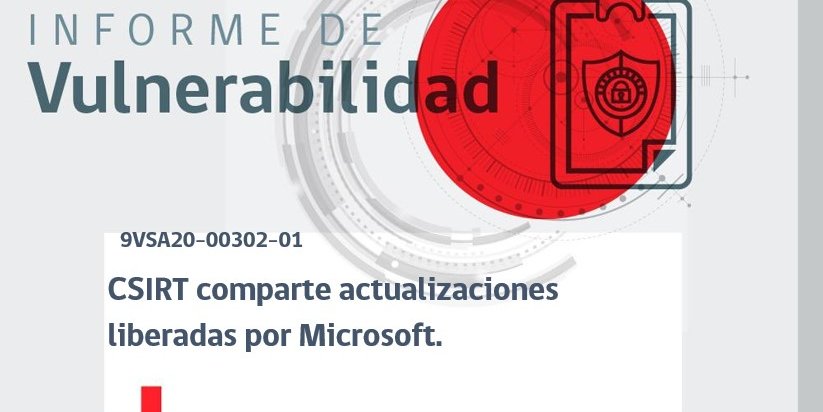9VSA20-00302-01 CSIRT comparte actualizaciones liberadas por Microsoft
CSIRT comparte la información entregada por Microsoft en su reporte mensual de actualizaciones correspondiente a octubre de 2020

Resumen
El Equipo de Respuesta ante Incidentes de Seguridad Informática, CSIRT, comparte la información entregada por Microsoft en su reporte mensual de actualizaciones correspondiente a octubre de 2020, parchando 28 vulnerabilidades en sus softwares clasificando a dos de ellas como crítica y 26 como importantes, además se informa de 60 vulnerabilidades adicionales al reporte mensual, 10 de ellas clasificadas como críticas y 50 como importantes.
Vulnerabilidades
Informadas en el reporte mensual correspondiente al mes de julio
ADV200012 CVE-2020-16928 CVE-2020-16942
CVE-2020-16889 CVE-2020-16929 CVE-2020-16947
CVE-2020-16896 CVE-2020-16930 CVE-2020-16949
CVE-2020-16897 CVE-2020-16931 CVE-2020-16954
CVE-2020-16901 CVE-2020-16932 CVE-2020-16955
CVE-2020-16904 CVE-2020-16933 CVE-2020-16957
CVE-2020-16914 CVE-2020-16934 CVE-2020-16969
CVE-2020-16918 CVE-2020-16937 CVE-2020-16995
CVE-2020-16919 CVE-2020-16938
CVE-2020-16921 CVE-2020-16941
Vulnerabilidades adicionales informadas
CVE-2020-0764 CVE-2020-16905 CVE-2020-16944
CVE-2020-1047 CVE-2020-16907 CVE-2020-16945
CVE-2020-1080 CVE-2020-16908 CVE-2020-16946
CVE-2020-1167 CVE-2020-16909 CVE-2020-16948
CVE-2020-1243 CVE-2020-16910 CVE-2020-16950
CVE-2020-16863 CVE-2020-16911 CVE-2020-16951
CVE-2020-16876 CVE-2020-16912 CVE-2020-16952
CVE-2020-16877 CVE-2020-16913 CVE-2020-16953
CVE-2020-16885 CVE-2020-16915 CVE-2020-16956
CVE-2020-16886 CVE-2020-16916 CVE-2020-16967
CVE-2020-16887 CVE-2020-16920 CVE-2020-16968
CVE-2020-16890 CVE-2020-16922 CVE-2020-16972
CVE-2020-16891 CVE-2020-16923 CVE-2020-16973
CVE-2020-16892 CVE-2020-16924 CVE-2020-16974
CVE-2020-16894 CVE-2020-16927 CVE-2020-16975
CVE-2020-16895 CVE-2020-16935 CVE-2020-16976
CVE-2020-16898 CVE-2020-16936 CVE-2020-16977
CVE-2020-16899 CVE-2020-16939 CVE-2020-16978
CVE-2020-16900 CVE-2020-16940 CVE-2020-16980
CVE-2020-16902 CVE-2020-16943 CVE-2020-17003
Impacto
Dependiendo de la vulnerabilidad informada por Microsoft se pueden provocar denegaciones de servicio, elevación de privilegios, acceso a información confidencial, ejecución de código remoto o spoofing. El detalle de cada una de ellas se podrá revisar en los enlaces.
De las vulnerabilidades publicadas hacemos incapié en el CVE-2020-16898 clasificado como crítico, debido a que existe una vulnerabilidad de ejecución remota de código cuando la pila TCP/IP de Windows maneja incorrectamente los paquetes de anuncios de enrutador ICMPv6. Un atacante que aproveche con éxito esta vulnerabilidad podría obtener la capacidad de ejecutar código en el servidor o cliente de destino.
Para aprovechar esta vulnerabilidad, un atacante tendría que enviar paquetes de anuncios de enrutador ICMPv6 especialmente diseñados a una computadora remota con Windows.
La actualización corrige la vulnerabilidad al corregir la forma en que la pila TCP / IP de Windows maneja los paquetes de anuncios de enrutador ICMPv6.
Productos Afectados
- 3D Viewer
- Adobe Flash Player
- Azure Functions
- Dynamics 365 Commerce
- Microsoft .NET Framework
- 0 Service Pack 2
- 5
- 5 y 4.6.2/4.7/4.7.1/4.7.2
- 5 y 4.6/4.6.1/4.6.2
- 5 y 4.7.1/4.7.2
- 5 y 4.7.2
- 5 y 4.8
- 5.1
- 5.2
- 6
- 6/4.6.1/4.6.2/4.7/4.7.1/4.7.2
- 8
- Microsoft 365 Apps for Enterprise (32-bit y 64-bit)
- Microsoft Dynamics 365 (on-premises) version 8.2 y 9.0
- Microsoft Excel
- 2010 Service Pack 2 (32-bit y 64-bit)
- 2013 RT Service Pack 1
- 2013 Service Pack 2 (32-bit y 64-bit)
- 2016 (32-bit y 64-bit)
- Microsoft Excel Web App 2010 Service Pack 2
- Microsoft Exchange Server
- 2013 Cumulative Update 23
- 2016 Cumulative Update 17
- 2016 Cumulative Update 18
- 2019 Cumulative Update 6
- 2019 Cumulative Update 7
- Microsoft Office
- 2010 Service Pack 2 (32-bit y 64-bit editions)
- 2013 Click-to-Run (C2R) (32-bit y 64-bit editions)
- 2013 RT Service Pack 1
- 2013 Service Pack 1 (32-bit y 64-bit editions)
- 2016 (32-bit y 64-bit editions)
- 2016 for Mac
- 2019 (32-bit y 64-bit editions)
- 2019 for Mac
- Online Server
- Web Apps 2013 Service Pack 1
- Web Apps 2010 Service Pack 2
- Microsoft Outlook
- 2010 Service Pack 2 (32-bit y 64-bit editions)
- 2013 RT Service Pack 1
- 2013 Service Pack 1 (32-bit y 64-bit editions)
- 2016 (32-bit y 64-bit editions)
- Microsoft SharePoint
- Enterprise Server 2013 Service Pack 1
- Enterprise Server 2016
- Foundation 2010 Service Pack 2
- Foundation 2013 Service Pack 1
- Server 2010 Service Pack 2
- Server 2019
- Microsoft Word
- 2010 Service Pack 2 (32-bit y 64-bit editions)
- 2013 RT Service Pack 1
- 2013 Service Pack 1 (32-bit y 64-bit editions)
- 2016 (32-bit y 64-bit editions)
- Network Watcher Agent virtual machine extension for Linux
- PowerShellGet 2.2.5
- Visual Studio Code
- Windows 10 (32-bit y 64-bit)
- Version 1607, 1709, 1803, 1809, 1903, 1909, 2004, para 32 bit, 64 bit y ARM64-based
- Windows 7
- 32-bit Systems Service Pack 1
- x64-based Systems Service Pack 1
- Windows 8.1
- 32-bit systems
- x64-based systems
- Windows RT 8.1
- Windows Server 2008
- 32-bit Systems Service Pack 2
- 32-bit Systems Service Pack 2 (Server Core installation)
- x64-based Systems Service Pack 2
- x64-based Systems Service Pack 2 (Server Core installation)
- R2 for x64-based Systems Service Pack 1
- R2 for x64-based Systems Service Pack 1 (Server Core installation)
- Windows Server 2012
- 2012
- Server Core installation
- R2 y R2 (Server Core installation)
- Windows Server 2016
- 2016
- Server Core installation
- Windows Server 2019
- 2019
- Server Core installation
- Windows Server
- version 1903 (Server Core installation)
- version 1909 (Server Core installation)
- version 2004 (Server Core installation)
Mitigación
Aplicar las actualizaciones publicadas por el fabricante.
Enlaces
https://portal.msrc.microsoft.com/en-us/security-guidance/releasenotedetail/2020-Oct
https://portal.msrc.microsoft.com/en-US/security-guidance/advisory/ADV200012
https://portal.msrc.microsoft.com/en-US/security-guidance/advisory/CVE-2020-16889
https://portal.msrc.microsoft.com/en-US/security-guidance/advisory/CVE-2020-16896
https://portal.msrc.microsoft.com/en-US/security-guidance/advisory/CVE-2020-16897
https://portal.msrc.microsoft.com/en-US/security-guidance/advisory/CVE-2020-16901
https://portal.msrc.microsoft.com/en-US/security-guidance/advisory/CVE-2020-16904
https://portal.msrc.microsoft.com/en-US/security-guidance/advisory/CVE-2020-16914
https://portal.msrc.microsoft.com/en-US/security-guidance/advisory/CVE-2020-16918
https://portal.msrc.microsoft.com/en-US/security-guidance/advisory/CVE-2020-16919
https://portal.msrc.microsoft.com/en-US/security-guidance/advisory/CVE-2020-16921
https://portal.msrc.microsoft.com/en-US/security-guidance/advisory/CVE-2020-16928
https://portal.msrc.microsoft.com/en-US/security-guidance/advisory/CVE-2020-16929
https://portal.msrc.microsoft.com/en-US/security-guidance/advisory/CVE-2020-16930
https://portal.msrc.microsoft.com/en-US/security-guidance/advisory/CVE-2020-16931
https://portal.msrc.microsoft.com/en-US/security-guidance/advisory/CVE-2020-16932
https://portal.msrc.microsoft.com/en-US/security-guidance/advisory/CVE-2020-16933
https://portal.msrc.microsoft.com/en-US/security-guidance/advisory/CVE-2020-16934
https://portal.msrc.microsoft.com/en-US/security-guidance/advisory/CVE-2020-16937
https://portal.msrc.microsoft.com/en-US/security-guidance/advisory/CVE-2020-16938
https://portal.msrc.microsoft.com/en-US/security-guidance/advisory/CVE-2020-16941
https://portal.msrc.microsoft.com/en-US/security-guidance/advisory/CVE-2020-16942
https://portal.msrc.microsoft.com/en-US/security-guidance/advisory/CVE-2020-16947
https://portal.msrc.microsoft.com/en-US/security-guidance/advisory/CVE-2020-16949
https://portal.msrc.microsoft.com/en-US/security-guidance/advisory/CVE-2020-16954
https://portal.msrc.microsoft.com/en-US/security-guidance/advisory/CVE-2020-16955
https://portal.msrc.microsoft.com/en-US/security-guidance/advisory/CVE-2020-16957
https://portal.msrc.microsoft.com/en-US/security-guidance/advisory/CVE-2020-16969
https://portal.msrc.microsoft.com/en-US/security-guidance/advisory/CVE-2020-16995
https://portal.msrc.microsoft.com/en-US/security-guidance/advisory/CVE-2020-0764
https://portal.msrc.microsoft.com/en-US/security-guidance/advisory/CVE-2020-1047
https://portal.msrc.microsoft.com/en-US/security-guidance/advisory/CVE-2020-1080
https://portal.msrc.microsoft.com/en-US/security-guidance/advisory/CVE-2020-1167
https://portal.msrc.microsoft.com/en-US/security-guidance/advisory/CVE-2020-1243
https://portal.msrc.microsoft.com/en-US/security-guidance/advisory/CVE-2020-16863
https://portal.msrc.microsoft.com/en-US/security-guidance/advisory/CVE-2020-16876
https://portal.msrc.microsoft.com/en-US/security-guidance/advisory/CVE-2020-16877
https://portal.msrc.microsoft.com/en-US/security-guidance/advisory/CVE-2020-16885
https://portal.msrc.microsoft.com/en-US/security-guidance/advisory/CVE-2020-16886
https://portal.msrc.microsoft.com/en-US/security-guidance/advisory/CVE-2020-16887
https://portal.msrc.microsoft.com/en-US/security-guidance/advisory/CVE-2020-16890
https://portal.msrc.microsoft.com/en-US/security-guidance/advisory/CVE-2020-16891
https://portal.msrc.microsoft.com/en-US/security-guidance/advisory/CVE-2020-16892
https://portal.msrc.microsoft.com/en-US/security-guidance/advisory/CVE-2020-16894
https://portal.msrc.microsoft.com/en-US/security-guidance/advisory/CVE-2020-16895
https://portal.msrc.microsoft.com/en-US/security-guidance/advisory/CVE-2020-16898
https://portal.msrc.microsoft.com/en-US/security-guidance/advisory/CVE-2020-16899
https://portal.msrc.microsoft.com/en-US/security-guidance/advisory/CVE-2020-16900
https://portal.msrc.microsoft.com/en-US/security-guidance/advisory/CVE-2020-16902
https://portal.msrc.microsoft.com/en-US/security-guidance/advisory/CVE-2020-16905
https://portal.msrc.microsoft.com/en-US/security-guidance/advisory/CVE-2020-16907
https://portal.msrc.microsoft.com/en-US/security-guidance/advisory/CVE-2020-16908
https://portal.msrc.microsoft.com/en-US/security-guidance/advisory/CVE-2020-16909
https://portal.msrc.microsoft.com/en-US/security-guidance/advisory/CVE-2020-16910
https://portal.msrc.microsoft.com/en-US/security-guidance/advisory/CVE-2020-16911
https://portal.msrc.microsoft.com/en-US/security-guidance/advisory/CVE-2020-16912
https://portal.msrc.microsoft.com/en-US/security-guidance/advisory/CVE-2020-16913
https://portal.msrc.microsoft.com/en-US/security-guidance/advisory/CVE-2020-16915
https://portal.msrc.microsoft.com/en-US/security-guidance/advisory/CVE-2020-16916
https://portal.msrc.microsoft.com/en-US/security-guidance/advisory/CVE-2020-16920
https://portal.msrc.microsoft.com/en-US/security-guidance/advisory/CVE-2020-16922
https://portal.msrc.microsoft.com/en-US/security-guidance/advisory/CVE-2020-16923
https://portal.msrc.microsoft.com/en-US/security-guidance/advisory/CVE-2020-16924
https://portal.msrc.microsoft.com/en-US/security-guidance/advisory/CVE-2020-16927
https://portal.msrc.microsoft.com/en-US/security-guidance/advisory/CVE-2020-16935
https://portal.msrc.microsoft.com/en-US/security-guidance/advisory/CVE-2020-16936
https://portal.msrc.microsoft.com/en-US/security-guidance/advisory/CVE-2020-16939
https://portal.msrc.microsoft.com/en-US/security-guidance/advisory/CVE-2020-16940
https://portal.msrc.microsoft.com/en-US/security-guidance/advisory/CVE-2020-16943
https://portal.msrc.microsoft.com/en-US/security-guidance/advisory/CVE-2020-16944
https://portal.msrc.microsoft.com/en-US/security-guidance/advisory/CVE-2020-16945
https://portal.msrc.microsoft.com/en-US/security-guidance/advisory/CVE-2020-16946
https://portal.msrc.microsoft.com/en-US/security-guidance/advisory/CVE-2020-16948
https://portal.msrc.microsoft.com/en-US/security-guidance/advisory/CVE-2020-16950
https://portal.msrc.microsoft.com/en-US/security-guidance/advisory/CVE-2020-16951
https://portal.msrc.microsoft.com/en-US/security-guidance/advisory/CVE-2020-16952
https://portal.msrc.microsoft.com/en-US/security-guidance/advisory/CVE-2020-16953
https://portal.msrc.microsoft.com/en-US/security-guidance/advisory/CVE-2020-16956
https://portal.msrc.microsoft.com/en-US/security-guidance/advisory/CVE-2020-16967
https://portal.msrc.microsoft.com/en-US/security-guidance/advisory/CVE-2020-16968
https://portal.msrc.microsoft.com/en-US/security-guidance/advisory/CVE-2020-16972
https://portal.msrc.microsoft.com/en-US/security-guidance/advisory/CVE-2020-16973
https://portal.msrc.microsoft.com/en-US/security-guidance/advisory/CVE-2020-16974
https://portal.msrc.microsoft.com/en-US/security-guidance/advisory/CVE-2020-16975
https://portal.msrc.microsoft.com/en-US/security-guidance/advisory/CVE-2020-16976
https://portal.msrc.microsoft.com/en-US/security-guidance/advisory/CVE-2020-16977
https://portal.msrc.microsoft.com/en-US/security-guidance/advisory/CVE-2020-16978
https://portal.msrc.microsoft.com/en-US/security-guidance/advisory/CVE-2020-16980
https://portal.msrc.microsoft.com/en-US/security-guidance/advisory/CVE-2020-17003
Informe
El informe oficial publicado por el CSIRT del Gobierno de Chile está disponible en el siguiente enlace: 9VSA20-00302-01